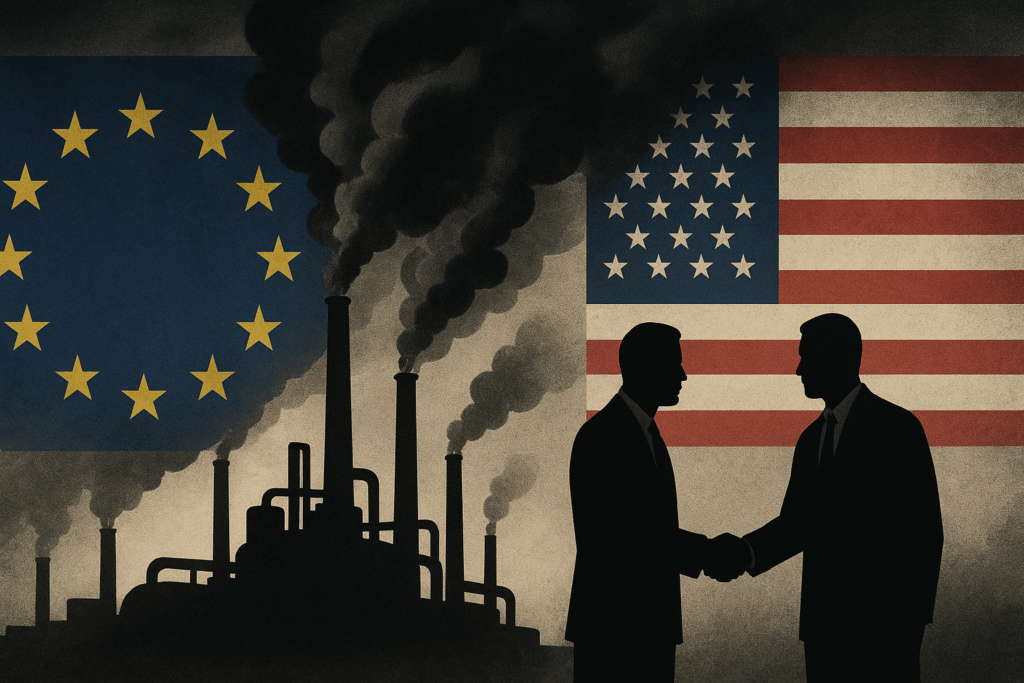Republicans on the U.S. House Armed Services Committee have decided that the military’s push for clean, renewable energy has gone far enough, and have proposed for next year’s budget that the Pentagon not spend a dime on renewable energy sources that cost more than traditional dirty energy.
This news comes on the heels of the Navy’s announcement of their new “Great Green Fleet,” which features an aircraft carrier and strike group that are all powered by renewable, cleaner energy sources.
The shift in policy came from the House Armed Services Committee, chaired by California Republican Howard “Buck” McKeon. Republicans on the committee complain that the fuel being used for the “green fleet” and other military renewable energy projects is too costly, and contend that the military should never spend more on a renewable energy source that is more costly than traditional petroleum.
As WIRED reports:
In its report on next year’s Pentagon budget, the House Armed Services Committee banned the Defense Department from making or buying an alternative fuel that costs more than a “traditional fossil fuel.” It’s a standard that may be almost impossible to meet, energy experts believe; there’s almost no way the tiny, experimental biofuel industry can hope to compete on price with the massive, century-old fossil fuels business.
But if the measure becomes law, it would make it all-but-inconceivable for the Pentagon to buy the renewable fuels. It would likely scuttle one of the top priorities of Navy Secretary Ray Mabus. And it might very well suffocate the gasping biofuel industry, which was looking to the Pentagon to help it survive.
…the Green Fleet’s 450,000 gallons of fuel made from chicken fat and other waste greases (plus a dollop of algae oil) didn’t come cheap. At $12 million — arguably the biggest biofuel purchase in military history — the algae-chicken goop costs about four times more than an old-school petroleum product.
But the armed services committee didn’t put limits on all alternative fuels — just the ones with environmental benefits. The Energy Independence and Security Act of 2007 forbids federal agencies from buying alternative fuels that are more polluting than conventional ones. Last week, the congressmen ordered to exempt the Defense Department from those regulations.
House Republicans are absolutely right – this issue is squarely about money. But it isn’t the money that the Committee is spending; it is the money they are receiving, specifically from the energy industry. The 35 Republican members of the House Armed Services Committee have, combined, over their careers, received millions of dollars from the energy sector. Here are just a few examples, showing the totals that Republican members have received from the energy sector (data from the Center for Responsive Politics):
Chairman Howard McKeon – $200,200
Roscoe Bartlett – $156,500
Mac Thornberry – $656,854 (oil industry is his largest donor.)
Todd Akin – $156,500
J. Randy Forbes – $117,500
Jeff Miller – $144,250
Joe Wilson – $207,356
Allen West – $129,299
The list could go on and on, but these few examples show where the loyalty of the Armed Services Committee lies.
The Pentagon is currently the largest consumer of biofuels and renewable energy, and forcing them to purchase oil instead of clean energy will have a devastating effect on the renewable industry.
The military currently spends about $13 billion a year on fuel, which is why last year the Pentagon released a new, clean energy strategy that would save the agency money in the long run. Reports over the years have heralded the military’s push for clean energy, hoping that the private sector would follow suit.
But the Republicans on the Armed Services Committee are too near-sighted to see the long-term benefits: They only want to focus on the immediate costs. But what they fail to see is that, yes, the biofuels are more expensive in the short-term, but they actually save us money in the long-term. This is known as “externalizing the cost of oil.”
Here’s how the costs have been externalized: In the last decade, more than 3,000 American troops and contractors overseas have been killed trying to protect petroleum convoys. The costs of the lives lost, future productivity, pensions, etc. are all passed along to taxpayers.
Then there are the health effects that come from the burning of traditional dirty energy sources. Estimates (on the low end) show that our economy loses about $29 billion every year due to health costs related to air pollution from the burning of fossil fuels.
When added together with the environmental costs, that total approaches well over $230 billion every year. And that’s the low-end estimate. The high end has the total externalized cost of oil for just health and environment at $942 billion a year. You can also go ahead and add in that extra $4 billion a year we’re giving to the oil industry in subsidies.
Oil costs us our environment, our health, our dollars, and even our lives. Sadly, none of those costs are factored into the budgets of the Republicans sitting on the House Armed Services Committee.
Subscribe to our newsletter
Stay up to date with DeSmog news and alerts






